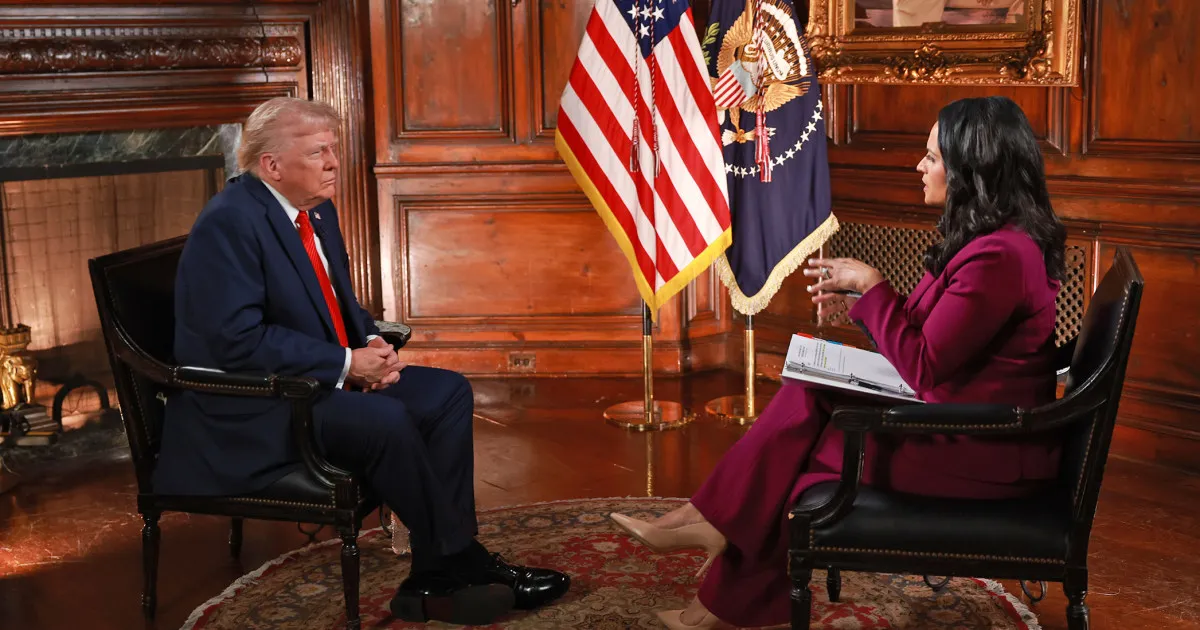
In a recent interview with NBC News’ “Meet the Press,” President Donald Trump made headlines by suggesting that his ambitious campaign promise to execute mass deportations could take precedence over the constitutional rights of immigrants. This bold assertion raises questions about due process and the legal framework surrounding immigration in the United States.
During the 2024 campaign, Trump pledged to implement the “largest deportation operation” in U.S. history. His administration is currently advocating for the immediate removal of immigrants accused of being affiliated with a Venezuelan gang, without allowing them the opportunity to present their case in court. In stark contrast, Secretary of State Marco Rubio affirmed in a prior interview that every individual in the United States is entitled to due process, a right enshrined in the Constitution.
When confronted with this principle, Trump expressed uncertainty. “I don’t know. I’m not a lawyer. I don’t know,” he remarked when moderator Kristen Welker asked if he agreed with Rubio's assertion. His comments, made from his Mar-a-Lago resort in Florida, highlight a significant divergence in opinions regarding the treatment of immigrants under U.S. law.
The Fifth Amendment of the Constitution states that “no person” can be deprived of life, liberty, or property without due process. Importantly, this provision applies to all individuals, not just U.S. citizens, a fact recognized by the Supreme Court over the years. Trump, however, suggested that adhering to due process would hinder his administration's ability to act swiftly against what he describes as “homegrown criminals.”
He argued that the judicial process would be excessively time-consuming, claiming, “if you’re talking about that, then we’d have to have a million or 2 million or 3 million trials.” Trump insisted he was elected to remove dangerous individuals from the country, stating, “the courts are holding me from doing it.” Welker countered this by reminding him of the constitutional obligations of the presidency.
Despite Trump's assertion that he is not defying the Supreme Court, recent rulings have made it clear that his administration must respect basic due process rights for immigrants. This does not necessarily require full trials but mandates the opportunity to appear before an immigration judge, a role distinct from the judicial branch.
One contentious strategy employed by the Trump administration involves invoking the Alien Enemies Act of 1798 to expedite the deportation of alleged members of the Venezuelan gang, Tren de Aragua. This law, historically used during wartime, is being applied in a novel way, with the administration claiming that the gang represents an invading force linked to the Venezuelan government. However, this approach faces significant legal pushback, with courts blocking deportations under this law due to the lack of due process.
The case of Kilmar Abrego Garcia, a Salvadoran man deported despite a judge's order against it, exemplifies the controversies surrounding the Trump administration's immigration policies. After being accused of gang affiliation, which his family and attorney deny, Abrego Garcia faced deportation, leading to a Supreme Court ruling that ordered his return to the U.S. to contest his case. The administration has acknowledged that deporting him was an “administrative error,” yet has made little effort to rectify the situation.
When asked about communication with the Salvadoran government regarding Abrego Garcia's return, Trump replied, “You’d have to ask the attorney general that question.” This response underscores the administration's complicated relationship with legal processes surrounding immigration.
Trump suggested that he might seek further clarification from the Supreme Court regarding the term “facilitate” as it relates to Abrego Garcia’s case. Although lower courts have ruled against the administration on this issue, Trump appears resolute in pursuing his objectives, stating he relies heavily on his legal team to navigate these challenges.
Moreover, the administration has other avenues to expedite the deportation process, such as proposing changes in immigration laws or increasing resources for immigration judges to address the backlog of cases. However, the administration's actions have included firing some judges, raising concerns about its commitment to a fair judicial process.
During the interview, Welker raised the issue of lawful residents potentially needing to carry documentation to prove their status, given the administration's track record of mistakenly detaining individuals. Trump dismissed this notion, pivoting to the dangers posed by illegal immigrants, including those he claims have harmed Americans.
Throughout the interview, Trump consistently emphasized his legal counsel's guidance, indicating that he intends to adhere to the law while pursuing his immigration agenda. He also reiterated his willingness to engage in legal battles, particularly regarding the tax-exempt status of institutions like Harvard University, which recently challenged the federal government over funding issues.
This evolving discourse on immigration and due process highlights the ongoing challenges at the intersection of law and policy under the Trump administration, emphasizing the contentious nature of his approach to mass deportations and immigrant rights.